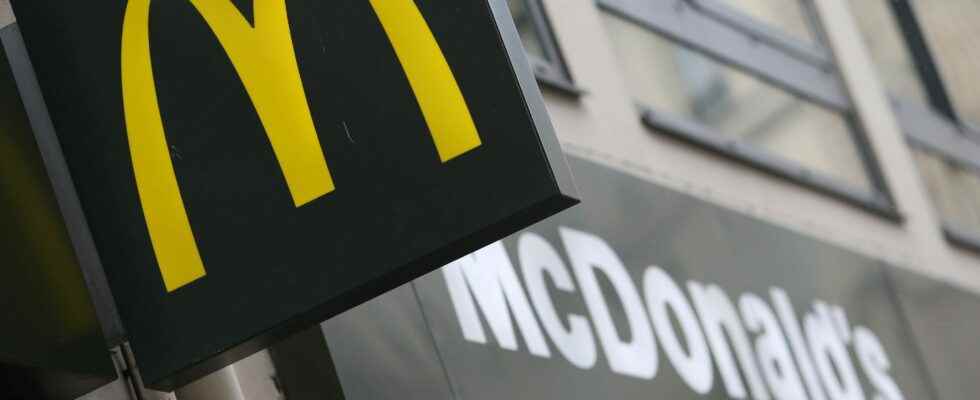No more cardboard McDonald’s fries cones! Since January 1, customers of the famous fast food restaurant who choose to eat on site have had washable dishes. Ronald is not the only one concerned: the anti-waste law for a circular economy (Agec) obliges all restaurants with more than 20 seats to do the same.
A good student in the class, McDonald’s has anticipated and has been working “for more than two years to implement a solution” for reusable tableware. “In the beginning, we had quite a few problems with theft. The HappyMeal tableware [NDLR : la formule enfant] is much too pretty!”, says a franchisee. But at least the American chain is ready. being not so simple. At Class’Croute (140 restaurants, half of which are affected by the law), the franchisor and certain franchisees continue to experiment without being certain of having found the martingale. “We have switched to 100% glass for lunch to take away and on site but the price of the deposit (7 €) was dissuasive. We therefore backtracked by finding an alternative to the deposit. Takeaway meals will remain packaged in disposable material and those to be consumed on the spot in glass”, testifies Mathieu Rabaud, the general manager of the brand.
However, such management of different containers is not self-evident. “We had to explain to the customer that, if he chose a plastic container, he could not consume on the spot”, noted Marc Desprès, owner of four Class’Croute in Strasbourg. Finally, to reduce the risks, the restaurateur decided to display the glass containers in the fridge by adding clear signage that allows customers to ask at the disposable tableware counter if they want to take their lunch away.
This novelty is also not without presenting difficulties for the personnel, because this double packaging complicates the management of stocks and, worse, generates waste… Quite the opposite of the spirit of the Agec law. “With us, the mode of consumption depends a lot on the weather. From one day to the next, we can have more customers than usual in the room. Therefore, we can find ourselves in the grotesque situation of throwing food because we have exhausted the stock of salad ‘to eat on the spot’ but not that ‘to take away’. The reverse is also possible”, explains Marc Desprès. A real puzzle that does not spare even Ronald McDonald. “Although we have already received a positive reception from our customers, we know that it will be important to continue to familiarize them with this novelty. The objective is to make it easy, both for consumers as well as for team members, to make the solutions reusable so that they can be used again in the best conditions”, replies the American franchise, which we understand will also probably make adjustments in the coming weeks.
The crockery dilemma
The other adaptation that restaurateurs have to face is that of washing! Create a diver position? Impossible, both economically and in terms of recruitment. However, the alternatives are not legion. “Where possible, we advise franchisees to buy a dishwasher. Elsewhere, different solutions must be studied,” says Mathieu Rabaud. Thus, its franchisee Marc Desprès is currently in full experimentation. “We are thinking about pooling resources between restaurateurs and we are also calling on the company Uzaje, which specializes in outsourcing dishwashing,” he explains.
This company, which intends to deploy within two years in all the major cities of France, won a call for projects from the Eurometropolis of Strasbourg, which supported, for 4 months, 50% of the additional cost to this outsourced washing. An experiment that stopped at the end of December. “The activity is very recent and turns out to be very technical. Restaurants choosing reusable plastic are faced with a dilemma because this material does not dry out, scratches and becomes opaque over time. We have invested two million euros of R&D to create a solution on a conveyor and a 40-meter-long forward principle, which ends in a clean room and a complete wash in just two minutes”, explains Emmanuel Auberger, founder and leader of Uzaje.
Not yet structured, this outsourced washing market, which also concerns restaurants in amusement parks and motorway service stations, could also benefit… caterers, not concerned by this aspect of the Agec law and already having solutions for their own use. “We have trucks on the road all day long which leave full and leave empty, testifies Ghyslain Morvan, boss of the Valore group, which brings together a dozen catering companies and snacking. On their tour, they can easily pick up the dishes in restaurants to send them to the group’s washing company. It’s a carbon saving for everyone and an optimization of journeys for us. We are in the test phase with restaurants in the Montpellier region. We are moving forward and we are looking for the solution together.”
Because the price of buying or renting reusable dishes and washing them generates an additional cost of several tens of cents per dish, restaurants will turn to internal solutions as much as possible in order to limit the rise in prices. In its infancy today, the dishwashing outsourcing market nevertheless appears to be a new profession in the process of development.
